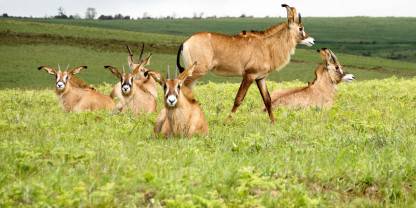Average Expert Rating
Rating Breakdown
Write a User ReviewA Remote Highland Paradise
Read more
predators are often seen on night drives.Nyika is very much a park for certain niche interest groups. Of particular interest to botanists are roughly 200 orchid species, which generally flower in January and February. For birders, the grassland around the only camp is a good place to see Denham’s bustard, Crawshay’s red-winged francolin and montane marsh widowbird. The Chowo Forest is also home to many localised species, notably bar-tailed trogon, Sharpe’s akalat, olive-flanked robin-chat and white-chested alethe. Another special bird here is scarlet-tufted malachite sunbird, which experienced guides can usually find for you by visiting the specific proteas on which it feeds. Above all, this is Malawi’s finest walking and hiking destination, thanks to the spectacular scenery, overwhelming sense of space, and the high chance of spotting wildlife on foot. Note that you need to fly in or drive along a very rough road, so allow for a stay of three nights or longer to justify the effort of getting there.
Like Scotland – With Zebras!
The Nyika Plateau is the centrepiece of the park, with its rolling montane grasslands – looking like Scotland! The conifer plantations around Chelinda Lodge and Camp reinforce this impression.
Visitors are pretty much guaranteed to see roan antelope, zebra, eland, reedbuck and bushbuck. There is supposedly a high density of leopards but the closest we got was a steaming pile of scat! However, on a night drive we saw two servals, which are apparently quite commonly seen. We visited in winter when it was very chilly indeed. Far more sensible is to visit in summer, when the flowers are out. Nyika is a botanical treasure trove with more than 200 orchid species, 11 of which are endemic to Nyika. Summer is also the best time for birding – specialities include mountain marsh widow, Denham’s bustard and the beautiful metallic blue swallow. You are no longer allowed to walk freely in Nyika, so the network of footpaths radiating from Chelinda can only be explored in the company of a guide.
Where the Leopard Is King
Nyika is not a conventional game reserve: the scenery is more reminiscent of the English countryside than the African bush. Located on a high-altitude plateau, animals are easy to spot from a distance in the open grassland. You won’t easily see many flagship species, but a few years ago I was lucky to see elephants, which sometimes come up from the lower areas where they are more common. Night drives are highly recommended; we spotted a leopard on one of these extremely cold nights out. Nyika has the highest density of leopards in Malawi and lucky guests might see them during the day around the lodge warming up in the early-morning sun after a cold night on the prowl.
Leopards and Rolling Grasslands
With its highlands scenery at 2,000m-plus above sea level, the Nyika Plateau is a hit with landscape photographers and travellers who want to escape from the lakeside crowds – and are prepared to brave the corrugated road to the lodge, camp and campsite at Chelinda. Visiting this distinctive part of Malawi is all about enjoying sunsets in the shimmering grasslands, but wildlife drives and guided walks are offered and, if you join a night drive, you may spot one of Nyika’s dense population of leopards. The big cats prey on the large herds of roan, eland and zebra scattered across the rolling hills, which you can view by mountain bike or on the three-day hike to the historic mission station at Livingstonia. With over 400 bird species, birding is excellent (especially in October and November), while fishers can catch rainbow trout in Chelinda’s three dams.

